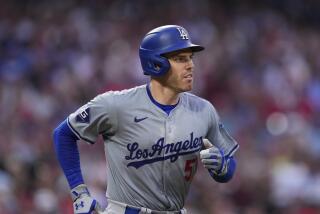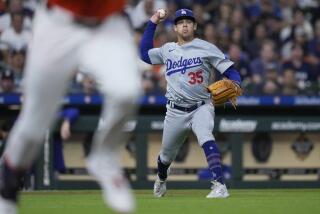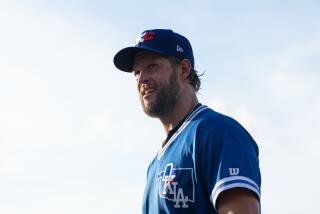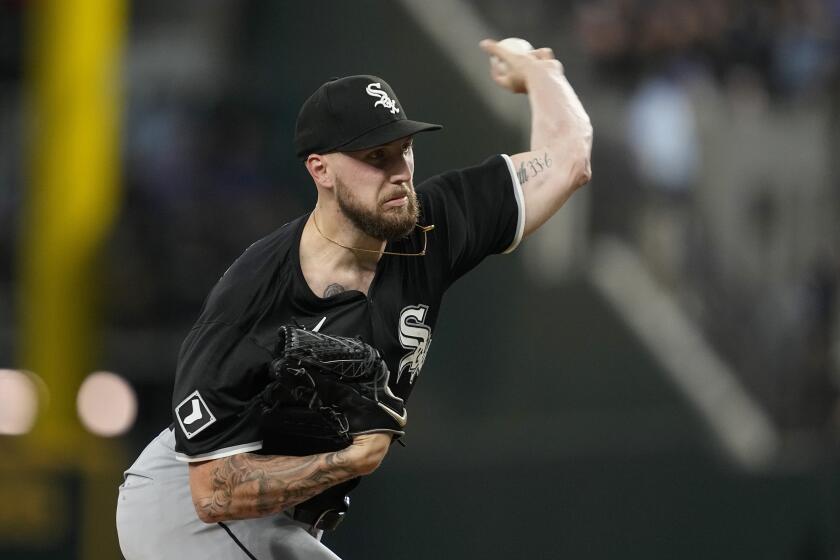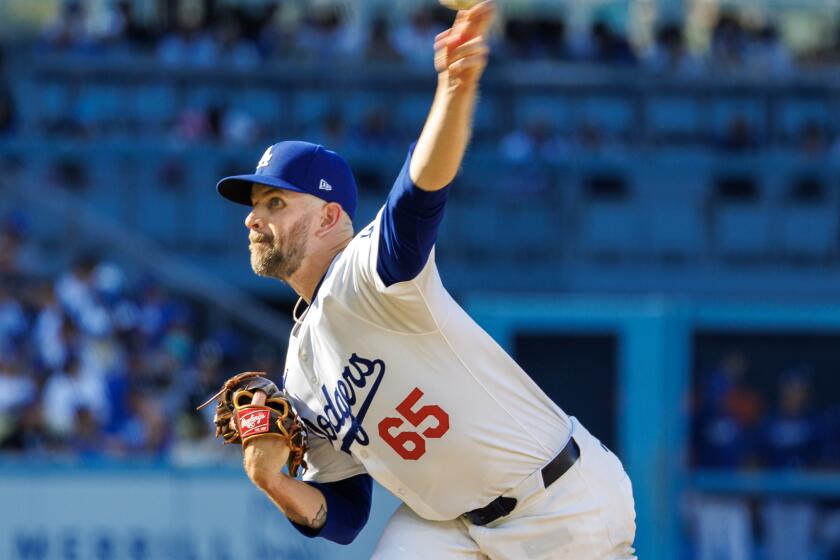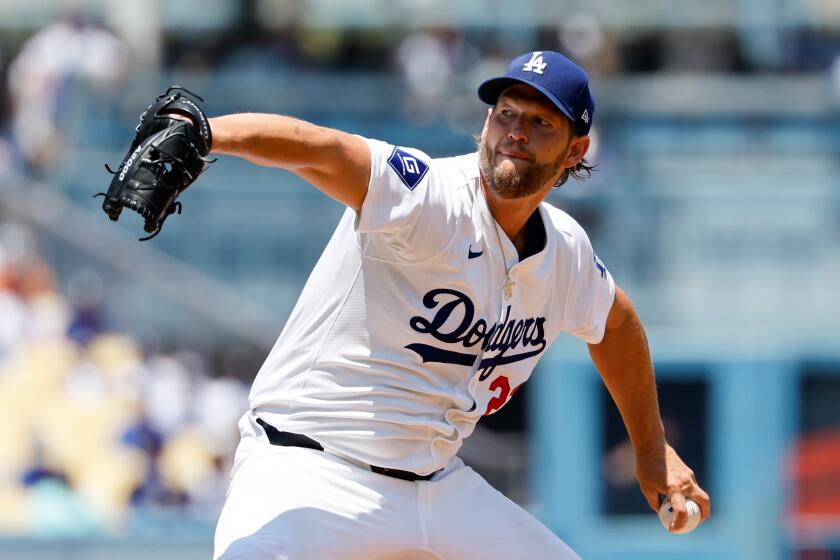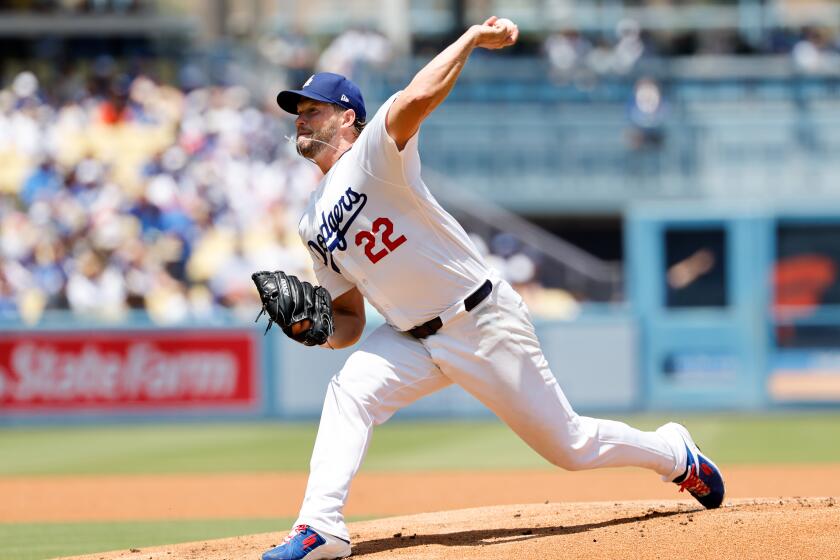Dodgers a Team in Name Only : Baseball: Strawberry says they lack heart. Butler says they play as individuals, not group.
When asked to account for the one-game difference between the 1991 Dodgers and first place Atlanta Braves on Sunday, Darryl Strawberry used a simple gesture to dispel what remained of a championship aura.
With his right hand, he tapped the upper left side of his chest.
“We didn’t have enough of this right here,” he said, still tapping. “Just didn’t have enough.”
When asked the same question, Brett Butler lowered his voice and shook his head.
“We were a team, but we were not a family . . . and the Atlanta Braves were both,” Butler said. “We came to the park, we worked and then we went our separate ways. We were too many individuals and not enough of a group.”
When reviewing the season, during which the Dodgers had the fourth-best record in baseball, led the West Division for 133 days and still finished second to the Braves, key points abound.
There was the seven-game losing streak immediately after the All-Star break. Before that, the Dodgers had the best record in baseball.
There was the 3-7 trip to Houston, Cincinnati and San Franciso in early August. Before that, the Dodgers had thought the seven-game losing streak was a fluke.
There were the two losses in three games in Atlanta three weeks ago. Before that, the Dodgers thought the Braves would be easily intimidated.
There was the loss to the San Diego Padres on five infield hits in the eighth inning last Wednesday. Before that, the Dodgers thought it was their destiny to win.
There was the mid-season injury to Jay Howell, the late-season injury to Alfredo Griffin and the season-long injuries of Kal Daniels.
But according to some veterans, the biggest points were off the field, in a clubhouse that was devoid of energy and lacking inspiration.
According to the veterans, it was a clubhouse that lived up to its perception: a bunch of rich guys simply making a living.
“This was a team where after a good play, half the guys would shake your hand and the other half . . . I don’t know what they would be doing,” said Strawberry, who led the team with 28 home runs and 99 runs batted in, both close to his career averages of 31.5 home runs and 91.6 RBI.
“There was not enough guys with enough fire,” Strawberry said. “This team was not even comparable to the 1986 New York Mets because there, we were into everything somebody did. We were into each other.
“Here, we just have a bunch of low-key guys, and that’s not what it takes for winning.”
One of the biggest examples of the Dodger problems, said the players, occurred in the clubhouse after every game.
Within 30 minutes, with the exception of Butler, Strawberry, Mike Scioscia and a couple of others, that clubhouse was abandoned.
“In my whole career, I have never seen guys clear out like that,” said Butler, who batted a team-leading .296 and scored a league-leading 112 runs.
“I can understand it happening at home, where guys have their families, but even on the road?
“With other teams I’ve been with, after the game you sit around, you talk about the game, you enjoy each other and the team. But not this team.”
Strawberry said he also was shocked by the apparent rush for the door, particularly after difficult losses.
“The attitude was like, ‘Well, OK, tomorrow is another day. we’ll just come back and get ‘em tomorrow. . . .’ And then they were gone,” he said. “It was bad, real bad. On other teams I’ve been with, we would sit together in the clubhouse for an hour or so, talking about the importance of all this.”
Some critics have said that removing beer from the clubhouse has cut down on camaraderie because players head for somewhere they can have a drink.
“This could be the case,” said Butler, who does not drink. “Whatever the case, I wish something would change.”
The Dodgers also did not socialize as a team off the field, according to the players, a fact that became painfully evident at a mid-August party thrown by Jim Gott.
It was the only team party of the season. The estimated crowd count was 12 players. Even Strawberry did not show up.
“Yes, I was disappointed,” Gott said. “Getting together like that can really make a difference. Of course, you look at the old Oakland Athletics, they hated each other and they still played great. So maybe togetherness doesn’t mean as much as everybody thinks it does.”
One reason for this apparent distance between players is that so many came from other organizations. It was fitting that during Saturday’s loss, which eliminated the Dodgers from contention, the nine starters all came from other organizations.
Butler said he sometimes tried bring everyone together in the clubhouse by being loud. But it was not him.
“And it did not work, anyway,” he said. “I tried to get some of the guys to start feeding off each other, and nothing happening. If something had happened, absolutely it would have made a difference.”
These off-field problems led to an on-field attitude that hurt the Dodgers’ play, according to Strawberry.
“It was like guys were saying, ‘If I do, I do, and if I don’t, I don’t,’ ” Strawberry said. “We need to bring more excitement to the fans.”
For the first time in recent memory, these Dodgers did not have an on-field brawl. They exchanged few barbs with opponents. There were no suspensions and few fines from the league office.
They won, but not with the abandon of winners.
“Sometimes you have to be arrogant. Sometimes you have to speak up in this game,” Strawberry said. “We didn’t show any of that.”
Manager Tom Lasorda did not agree that the players lacked heart. But he acknowledged that this was a different sort of team from the “families” he managed during his earlier years.
“There is no doubt in my mind that every player gave their full effort. I was really impressed with the attitude,” Lasorda said. “And I think there was a lot of togetherness. You rarely saw guys throwing stones at each other.”
But, Lasorda added, “All these guys being from different organizations, it’s like they are adopted sons. Back in the early ‘70’s, we had a bunch of guys playing for me who came up with me through the minor leagues.
“They did everything together. They were ‘my’ guys.”
Strawberry thinks that feeling can return to the Dodger clubhouse with a couple of changes, which will be easy because the Dodgers have nine free agents and two other veterans who could leave because of expired contracts.
For example, Strawberry says the Dodgers should try to acquire free agent Bobby Bonilla, who could play third base if second baseman Juan Samuel departs as a free agent and Lenny Harris and Mike Sharperson take Samuel’s place.
“We need a solid guy like him, a big right-handed bat who plays hard and cares,” Strawberry said. “Whatever we do, we do not have the right mix of players right now, and we might have to go to a whole new look. And I think Fred Claire (Dodger vice president) agrees with that.”
Said Butler: “We did not have the magic of the 1988 Dodgers team. But we can have the magic. I do not know how that will be done, but I do know that eight to 10 players might not be here next year, whether they are free agents or not. It could be a whole new game.”
More to Read
Are you a true-blue fan?
Get our Dodgers Dugout newsletter for insights, news and much more.
You may occasionally receive promotional content from the Los Angeles Times.
